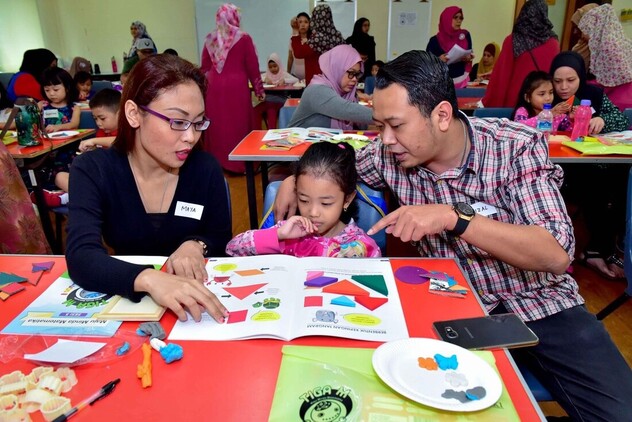KelasMateMatika
The formative years of a child's life are a critical window for development. For under-resourced families, additional support to equip and empower parents may help them build a strong foundation for their children.
We are excited to partner with Yayasan MENDAKI in their ongoing efforts to grow and enhance the KelasMateMatika programme, a parent-child programme which aims to promote the basic numeracy competencies of preschool children and improve their school readiness.
Piloted in 2018, the KelasMateMatika (KMM) programme run by Yayasan MENDAKI seeks to help parents with preschool children aged 4 to 6 years old gain confidence in teaching their children basic numeracy concepts to prepare them for primary school. Facilitators empower parents with Mediated Learning Experience (MLE)[1] skills, and guide them to apply the appropriate techniques in their child’s learning.
The four-week eKelasMateMatika (eKMM) programme was introduced in 2020 as engagement shifted online during the Covid-19 pandemic. The programme uses fun games and activities to nurture higher confidence level, communication skills and critical thinking skills. The weekly sessions also include hands-on activities to deepen life skills and encourage family bonding.
The four-week eKelasMateMatika (eKMM) programme was introduced in 2020 as engagement shifted online during the Covid-19 pandemic. The programme uses fun games and activities to nurture higher confidence level, communication skills and critical thinking skills. The weekly sessions also include hands-on activities to deepen life skills and encourage family bonding.
[1] A structured approach to learning that incorporates the use of a mediated agent who transforms and organises stimuli experienced in the environment to the learner. Source.
Children who have graduated from KMM will continue to be supported through developmental programmes that focus on other learning areas such as literacy, creative expression and discovery of the world. This includes experiential learning opportunities during the school holidays, which aim to broaden their exposure to different experiences (e.g. urban farming, aviation). Beyond KMM, the team seeks to foster ongoing engagement and support the children’s transition to primary school.
Since its pilot, KMM has seen early success in involving parents in their children’s early childhood education and uplifting their children’s numeracy abilities. Building on this early momentum, KMM aims to enrol 2,500 Muslim children in 2023. Quantedge Foundation’s support will go towards 100 low-income families.
Since its pilot, KMM has seen early success in involving parents in their children’s early childhood education and uplifting their children’s numeracy abilities. Building on this early momentum, KMM aims to enrol 2,500 Muslim children in 2023. Quantedge Foundation’s support will go towards 100 low-income families.
Preliminary outcomes:
- Since its pilot in 2018, KMM has supported more than 7,500 parents and children as of end 2022.
- In the last three years, about 8 in 10 KMM graduates were prepared for Primary 1 Mathematics and not placed in the Learning Support for Mathematics (LSM) Programme in Primary 1 i.e. deemed as being school ready.
- Programme evaluation findings showed that:
- Graduating from KMM is strongly linked with a child being deemed school-ready
- Parents with high expectations of child’s mathematical abilities were more likely to nurture children to be school-ready


